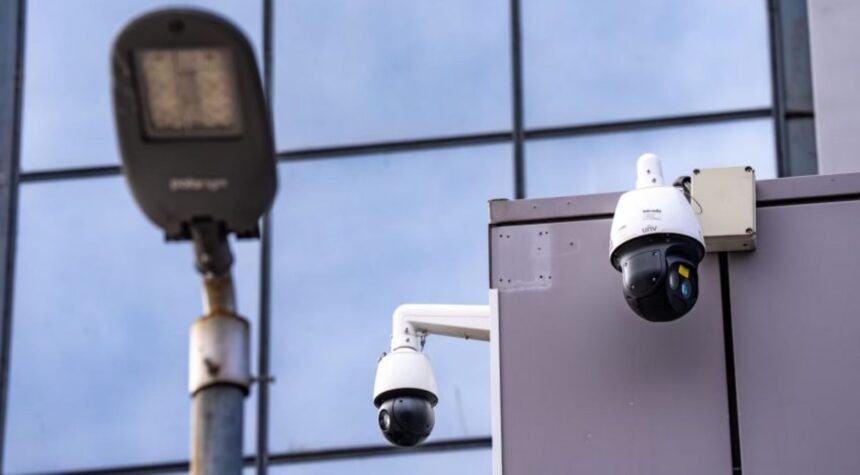In recent years, the Kosovo government has removed controversial Chinese-made surveillance cameras from its buildings and the main square in Prishtina. These cameras, sanctioned by the United States, have been partially replaced with other sanctioned but more acceptable alternatives, while some have been substituted with American-Canadian models.
The Kosovo government has replaced most of the Dahua security cameras—produced by a Chinese company blacklisted by the U.S.—from its premises.
“In the government building, the vast majority of security cameras have been replaced, covering the most critical security points,” government spokesperson Përparim Kryeziu told Radio Free Europe (RFE).
RFE had reported on the presence of these cameras in early 2022. At the time, the government led by the Vetëvendosje Movement stated it would review contracts from a security standpoint, as the cameras were procured by previous administrations.
According to Kryeziu, the replacement process began in late 2022.
“The remaining cameras are also being replaced. We are working to complete this as soon as possible,” he added.
U.S. Sanctions on Chinese Surveillance Companies
The U.S. Department of Commerce placed Dahua Technology and Hikvision on its blacklist in 2019 due to their alleged involvement in human rights violations in China, particularly in the repression of Uyghur Muslims in Xinjiang. These companies are considered security risks under the U.S. National Defense Authorization Act (NDAA).
However, new cameras installed at Kosovo’s government building are from another Chinese firm, Uniview, which was also sanctioned by the U.S. in December 2024. Despite this, Uniview’s products are not yet explicitly banned under NDAA regulations.
The Central Election Commission (CEC) recently purchased over 2,000 Uniview cameras to monitor the parliamentary elections on February 9. While the tender documentation included NDAA compliance as a requirement, the CEC has not clarified the legal basis for this condition or addressed security concerns regarding sanctioned Chinese products.
Chinese Cameras Still in Some Institutions
In 2022, RFE reported that Dahua and Hikvision cameras were still used in several government institutions, including the Special Prosecutor’s Office, the Ministry of Health, and the Ministry of Trade. These cameras remain in use in all three locations.
The Special Prosecutor’s Office and the Ministry of Trade have not responded to inquiries, while the Ministry of Health acknowledged that a 2021 government decision mandates compliance with U.S. sanctions. However, it noted that the cameras were purchased in 2019 before this decision was enacted. The ministry did not specify whether it plans to replace the existing cameras.
Meanwhile, Hikvision cameras previously monitoring Prishtina’s main squares have been replaced with Avigilon cameras from Motorola Solutions, produced in Canada and the U.S. The Prishtina municipality has not disclosed when or why the replacement occurred.
Security Concerns Over Chinese Surveillance Technology
According to RFE correspondent Reid Standish, the U.S. government has targeted Chinese surveillance companies due to their role in providing monitoring technology to the Chinese Communist Party, which allegedly facilitates the persecution of minority groups.
“Hikvision, for instance, was caught designing facial recognition software specifically to identify Uyghur faces,” Standish explained.
Concerns over Chinese surveillance technology stem from two main risks:
- Cloud-based systems used by some Chinese brands have been found to be more vulnerable than others.
- Chinese data laws allow the government to access and use company-stored data for national security purposes.
Although no evidence has emerged of these companies exploiting foreign surveillance data, such concerns have led the U.S. and the U.K. to blacklist multiple Chinese tech firms.
Kosovo’s Information and Privacy Agency has emphasized that institutions must ensure data security and avoid products that pose risks to personal information. However, it has not commented on specific brands or the application of U.S. security regulations in Kosovo.
While most European countries have not imposed outright bans on Chinese surveillance technology, many have opted to remove such cameras from government and military institutions.







